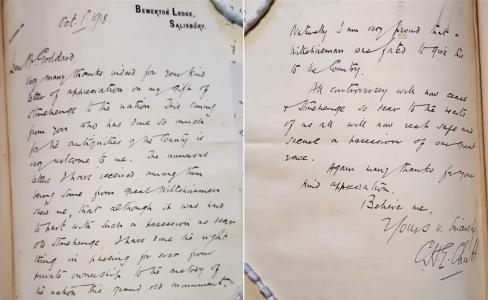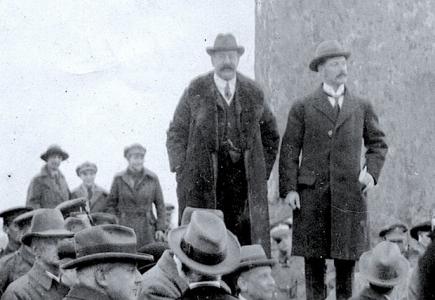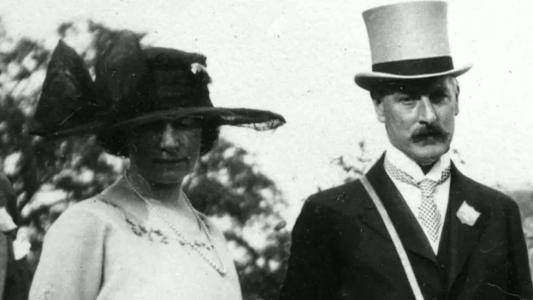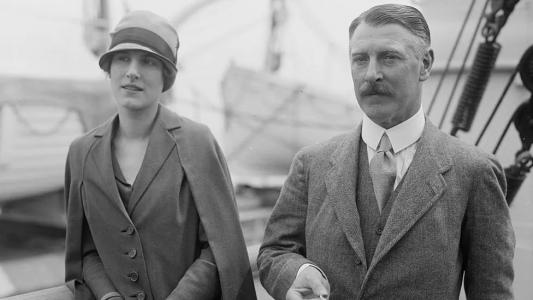Biography of Cecil Herbert Edward Chubb 1st Baronet 1876-1934
On 14 Apr 1876 Cecil Herbert Edward Chubb 1st Baronet was born to Alfred Chubb at Shrewton, Wiltshire [Map]. He attended Christ's College, Cambridge University [Map] where he was awarded a double first in Science and Law, leaving with Master of Arts and Bachelor of Law degrees.
In 1902 Cecil Herbert Edward Chubb 1st Baronet (age 25) and Mary Bella Alice Finch Lady Chubb (age 14) were married.
In 1904 [his son] John Corbin Chubb 2nd Baronet was born to Cecil Herbert Edward Chubb 1st Baronet (age 27) and [his wife] Mary Bella Alice Finch Lady Chubb (age 16).
On 21 Sep 1915 Cosmo Gordon Antrobus 5th Baronet (age 56) sold Stonehenge at auction. It was bought by Cecil Herbert Edward Chubb 1st Baronet (age 39); see Archaeologia Cambrensis Series 6 Volume 15 1905 Stonehenge.
Archaeologia Cambrensis Series 6 Volume 15 1905 Stonehenge. 22 Sep 1915. Sale of Stonehenge. — Great public interest was shown in the sale by auction at Salisbury yesterday [September 21st] of the Amesbury Abbey estate, including Stonehenge. Sir Howard Frank, of Messrs. Knight, Frank and Rutley, conducted the sale, and explained that the estate came into the market in consequence of the deaths of Sir Edmund Antrobus and of his only son, who was killed in action last October. The estate, which has many historical associations, comprises 6,420 acres, and has an estimated rental of £5,359. It was first submitted as a whole, but as no purchaser was forthcoming it was offered in lots, of which Amesbury Abbey and grounds formed the first. This was unsold. Farms and buildings in the town of Amesbury, however, sold at good prices, and most of the property changed hands. When Stonehenge was put up for sale Sir Howard Frank asked for an opening bid of £5,000. A bid for that amount was made at once, quickly followed by an advance of £100, and £6,000 was readied within a minute. Then there was a lull. The auctioneer said the price was a poor one for Stonehenge, which could not be valued, but if there were no further offers he would accept it. Bidding recommenced and mounted to £6,600, at which the property fell to a local landowner, Mr. C. H. E. Chubb (age 39), of Bemerton Lodge, Salisbury. After the sale Mr. Chubb said that when he went into the sale room he had no intention whatever of buying the monument. "While I was there," he added, I thought a Salisbury man ought to buy it, and that is how it was done." Asked if he had any plans for the future of Stonehenge, Mr. Chubb said that, while he intended to preserve the monument, he would do nothing for some little time, as he had to consider the position. — Times, September 22nd, 1915.
Profits Of Stonehenge. — -Mr. Chubb, the new owner of Stonehenge, will not be given legal possession for some months. Meanwhile he has formulated no plan for the future, except that he is determined to take every step to see that the stones are preserved as heretofore.
The opinion expressed locally is that Mr. Chubb has made an excellent bargain, quite apart from the historic interest attaching to Stonehenge. As the purchase price was £ 6,600, and the net receipts from fees paid by visitors to the enclosure average £ 360 per annum, the transaction, regarded in a cold commercial light, represents an investment of over 5 per cent.Times, September 23rd, 1915.
Stonehenge: Its Recent Sale And Price.- The following letter appeared in "The Times of October 6th, 1915:— Sir, — The sale by auction a few days ago of Stonehenge for the comparatively small sum of £ 6600 will, I think, cause regret in many quarters that the opportunity was lost of vesting this most important national monument in some public body, and of restoring to the public the access to it, free of charge, which had been enjoyed for countless centuries. It will be recollected that fourteen years ago litigation was undertaken with this object. The claim was made that two well-worn ways leading up to, and through, the outer circle of stones were obstructed by the inclosure, which was erected partly with the object of guarding the stones, but mainly for the purpose of enforcing a charge of admission of Is. a head. Those of us who were engaged in this attempt were worsted in the suit and were heavily mulcted in costs. It was not generally known, however, and could not be stated at the hearing of the suit, that at an early stage of the proceedings we offered to purchase the monument and a few acres of Down land surrounding it for the sum of £ 10,000, with the purpose of placing the monument under the full protection of the Ancient Monuments Act. The effect of this would be that the Government would be charged with the duty and cost of guarding and preserving the stones, and that access of the public to them would be secured, free of charge, for ever. 1 he then owner of the property did not object to a sale, but he said that his price was £ 50,000. For this sum he had already offered the monument to the Government, and when it was rejected, on the ground that it was altogether exorbitant, he threatened to sell the stones to an American millionaire, who would ship them across the Atlantic. The then Chancellor of the Exchequer, to whom the offer and threat were verbally made, very properly replied that if an attempt was made to remove the monument he would send a regiment from the camp on Salisbury Plain to prevent it. In spite of this rebuff, the excessive price was insisted upon, with the result that the suit was proceeded with. Since then the admission fees have been maintained, and I am informed that the visitors to Stonehenge have been only one-fourth in number of what they used to be. The net produce from the charge for admission has averaged the last three years L320, after deducting the cost of guarding and preserving it. The fees for admission during the last half-year have been greatly reduced in consequence of the war.
"When, a few weeks ago, the intended sale of the monument was announced, I would gladly have made an effort to raise a sum for its purchase, with the object of undoing the wrong which had been done in 1901. But I found that, in view of the many claims arising out of the war, it was impossible to raise by subscription even the moderate sum which appeared to be the full commercial value of the monument, based on the admission fees.
"There remained, however, the possibility that the monument might be purchased by some public body, such as the National Trust, who would maintain the charge for admission to it until more favourable times, when it would be possible to reduce or abolish that charge. In this view, the National Trust, at my suggestion, entered into a correspondence with Messrs. Knight, Frank and Rutley, the agents for the sale of the Amesbury estate. The society had no funds at its immediate disposal for such a purpose, but among its generous supporters there would probably have been found those who would advance the purchase-money on loan on the security of the admission fees. It was necessary, however, before applying to any such friends, to know the price demanded for the monument. The society was informed by the agents that the owner could not name a price, but was prepared to entertain any offer from the National Trust above the sum of £ 10,000 — a price evidently based upon the offer made for it fourteen years ago. The society replied to this that, after careful consideration, they had come to the conclusion that the minimum price named by the owner was altogether excessive, particularly in view of the exceptional conditions consequent on the war, and that they were unable to make an offer of that amount or above it.
"The reply of the agents to this, on September 17th, was 'that the vendor, who is a tenant for life of the property, would not be justified in selling Stonehenge previous to the auction except at a price which was considered by us (Messrs. Knight, Frank and Rutley) to be high.' They added — 'The reserve at the auction, however, is a low one, in our view, and is thousands of pounds below the amount mentioned in our previous letter,' namely, £10,000. They suggested that the National Trust should be represented at the auction. It was thus practically admitted that the price named by the owner in the previous letter was, in the opinion of the experienced agents who advised him, too high by some thousands. The letter was received by the National Trust on Saturday, September 18th, three days before the sale by auction. It was impossible, in this short interval, to make arrangements for finding the possible purchase-money. The society, therefore, was not represented at the auction, and made no bid. The monument was bought for S6600 by a gentleman resident in the neighbourhood, who has stated that he has bought it as an investment, but with the full intention of doing his best to preserve it a promise which I doubt not he will fulfil. Not the less, however, it is to be regretted that the monument has not become the property of some public body, with the prospect of the reduction or remission of the entrance fees. I may be permitted also to point out that the price obtained at the auction, while it confirms the opinion of the agents who conducted the sale, is also striking proof that the sum offered for the monument in 1901 was most generous, and such as, in the interest of the entailed estate and of the public, should have been accepted.
I am yours faithfully,
Eversley.
"Abbotsworthy House, Winchester,
"October 1st."
In 1918 Alfred Mond responded to Cecil Chubb's (age 41) letter:
Dear Sir,
It is with great pleasure that I learn from your letter of the 15th inst. that you have so generously decided to present to the nation a historic monument of such unique importance as Stonehenge. As the remains of a long bygone civilization, it has a value and interest equalled by no other monument in the United Kingdom. I fully share your enthusiasm for this amazing record of the past, situated so gloriously on Salisbury Plain.
As H.M. First Commissioner of Works, it is indeed a satisfaction to me to be able to accept on behalf of the Government and the nation your patriotic and public-spirited gift. I shall make it my duty to bring the same to the knowledge of the Prime Minister at the earliest opportunity. I will see that the necessary further steps are taken for the formal transfer of the property to the Ancient Monuments Board, who, I am sure, will guard this priceless possession with the sedulous care which it deserves.
As regards the latter part of your letter, I am in communication with the Treasury, and hope to obtain their concurrence to your proposal, with which I fully sympathize.
In 1918 Cecil Chubb (age 41) wrote a letter to Sir Alfred Mond, the holder of the office of "First Commissioner of Works" in Government and the man in charge of all things to do with Ancient Monuments under the 1913 Act:
Bemerton Lodge, Salisbury, 15th September 1918
Dear Sir,
Stonehenge is perhaps our best known and the most interesting of our national monuments, and has always appealed strongly to the British imagination. To me, who was born close to it and during my boyhood and youth visited it at all hours of the day and night, under every conceivable condition of weather – in driving tempests of hail, rain and snow, fierce thunderstorms, glorious moonlight, and beautiful sunshine, it always has had an inexpressible charm.
I became the owner of it with a deep sense of pleasure, and had contemplated that it might remain a cherished possession of my family for years to come. It has, however, been pressed upon me that the nation would like to have it for its own and would prize it most highly. I, therefore, have decided to give up this unique possession and offer it to you, his Majesty’s First Commissioner of Works, as a gift to be held for the nation.
It brings in a revenue, and its possession would be far from an expense. If my wife and I may express a wish, though far from making it a condition of the gift, we should be glad if during the continuance of the war the income could be handed to the Red Cross Society, whose work at the present time is of such great national value. This point, however, must be entirely within your discretion.
I have the honour to be
Yours faithfully
C.H.E Chubb (age 41)
01 Oct 1918. Letter from Cecil Herbert Edward Chubb 1st Baronet (age 42) to Mr Goddard.
Dear Mr Goddard
Very many thanks indeed for your kind latter of appreciation on my gift of Stonehenge to the nation. This, coming from you who has done so much for the antiquities of the County is very welcome to me. ...

On 26 Oct 1918 Cecil Herbert Edward Chubb 1st Baronet (age 42) gave Stonehenge to the nation with the following conditions:
First that the public shall have free access to the premises hereby conveyed and every part thereof on the payment of such reasonable sum per head not exceeding one shilling for each visit and subject to such conditions as the Commissioners of Works in the exercise and execution of their statutory powers and duties may from time to time impose Secondly that the premises shall so far as possible be maintained in their present condition Thirdly that no building or erection other than a pay box similar to the Pay Box now standing on the premises shall be erected on any part of the premises within four hundred yards of The Milestone marked "Amesbury 2" on the northern frontage of the premises and Fourthly that the Commissioners of Works will at all times save harmless and keep indemnified the Donors and each of them their and each of their estates and effects from and against all proceedings costs claims and expenses on account of any breach or non-observance of the covenants by the Donors to the like or similar effect contained in the Conveyance of the premises to the Donors.

The London Gazette 31987. Whitehall, October 6, 1919
Letters Patent have passed the Great Seal of the United Kingdom of Great Britain and Ireland conferring the dignity of a Baronet of the said United Kingdom upon the undermentioned gentlemen and the heirs male of their respective bodies lawfull begotten:
Sir John George Blaker, of Brighton, in the County of Sussex, Knight.
Sir Arthur Norman Hill, of Green Place, in the parish of Stockbridge, in the County of Southampton, Knight.
Sir Gerald Hemmington Ryan, of Hintlesham, in the County of Suffolk, Knight.
Sir Samuel Roberts, of Ecclesall and of Queen's Tower, in the City of Sheffield and West Riding of the County of York, Knight, Representative in Parliament for the Ecclesall Division of the said City of Sheffield.
Lieutenant-Colonel Harry Gilbert Barling, C.B., O.B.E., R.A.M.C., of Newnham, in the County of Gloucester.
Colonel Charles Edward Warde, O.B.E., of Barham Court, in the parish of Teston, in the County of Kent, in the Commission of the Peace and a Deputy Lieutenant for the said County. Temp. Lieutenant-Colonel Alexander Leith, M.C., of the City and County of the City of Newcastle-upon-Tyne.
John Arthur Brooke, of Almondbury, in the West Riding of the County of York, Esquire, in the Commission of Peace for the said West Riding and for the County of Ross.
Edward Clitherow Brooksbank, of Healaugh Manor, in the parish of Healaugh, in the West Riding of the County of York, Esquire, in the Commission of the Peace for the said West Riding and Vice-Chairman of the West Riding County Council.
Coles Child, of Bromley Palace, in the parish of Bromley, in the County of Kent, Esquire, in the Commission of the Peace and a Deputy Lieutenant for the said County.
Cecil Herbert Edward Chubb (age 43), of Stonehenge, in the County of Wilts, Esquire, in the Commission of the Peace for the City of Salisbury.
Around 1925. Cecil (age 48) and [his wife] Lady Mary (age 37) Chubb.

1926. Cecil (age 49) and [his wife] Mary Chubb (age 38) aboard RMS Auitania.

On 22 Sep 1934 Cecil Herbert Edward Chubb 1st Baronet (age 58) died at his home Rothwell Dene, Bournemouth. He was buried at Devizes Road Cemetery, Salisbury. His son [his son] John Corbin Chubb 2nd Baronet (age 30) succeeded 2nd Baronet Chubb of Stonehenge in Wiltshire.
On 12 Sep 1955 [his former wife] Mary Bella Alice Finch Lady Chubb (age 67) died.